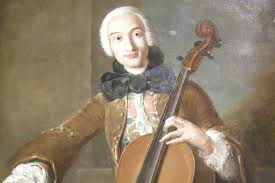February 18, 2013.Boccherini and Handel.For centuries, Italy, and Rome in particular, has attracted the best of composers of the time.Starting with the Renaissance, when Flemish and Spanish musicians practically created Italian music before the Italians got to it, during the Baroque era, and even in the 19th and 20th centuries (take for example the French Prix de Rome), composers from different countries flocked toRome and Naples.But of course it was not a one-way street, and some Italian composers went to foreign countries: Jean-Baptiste Lully – to France, Domenico Scarlatti – to Spain.And so did Luigi Boccherini.Boccherini was born in Lucca on February 19, 1743.As a young boy he was sent to study in Rome.When he was fourteen, his father took him to Vienna, where they worked in the band of the imperial Burgtheater.In 1761 Boccherini went to Madrid and stayed in Spain for the rest of his life (he died in 1805).One of the best pieces he wrote was the Cello concerto in B flat Major, the ninth of his cello concertos.Boccherini was a talented cellist himself, and composed 12 concertos for this instrument.You can listen to it here (courtesy of YouTube) in the performance by the 22-year old Jacqueline du Pré, with Daniel Barenboim conducting the English Chamber Orchestra (the recoding was made in April of 1967; Barenboim and du Pré married in June of that year in Jerusalem, right after the end of the Six-Day War).
George Frideric Handel was born February 23, 1685 in Halle, now Germany and back then – Duchy of Mageburg in Brandenburg-Prussia.He settled in England in 1712, becoming a British subject and, eventually, a national composer, but before that he, like so many, traveled to Italy.The year was 1706, Handel was only 21 but already an author of two operas.He arrived in Florence first, but then moved to Rome, where he stayed for four years.He wrote two more operas, Rodrigo and Aggripina.Both were staged outside of Rome, the former in Florence, the latter in Venice: at the time Pope Clement XI banned all opera performances in favor of sacred music.Handel also wrote cantatas and several oratorios.Here’s an excerpt from one of them, the oratorio La resurrezione, written in 1708.It’s performed by the Amsterdam Baroque Orchestra, Ton Coopman conducting (courtesy of youTube).
Boccherini and Handel 2013
February 18, 2013. Boccherini and Handel. For centuries, Italy, and Rome in particular, has attracted the best of composers of the time. Starting with the Renaissance, when Flemish and Spanish musicians practically created Italian music before the Italians got to it, during the Baroque era, and even in the 19th and 20th centuries (take for example the French Prix de Rome), composers from different countries flocked to Rome and Naples. But of course it was not a one-way street, and some Italian composers went to foreign countries: Jean-Baptiste Lully – to France, Domenico Scarlatti – to Spain. And so did Luigi Boccherini. Boccherini was born in Lucca on February 19, 1743. As a young boy he was sent to study in Rome. When he was fourteen, his father took him to Vienna, where they worked in the band of the imperial Burgtheater. In 1761 Boccherini went to Madrid and stayed in Spain for the rest of his life (he died in 1805). One of the best pieces he wrote was the Cello concerto in B flat Major, the ninth of his cello concertos. Boccherini was a talented cellist himself, and composed 12 concertos for this instrument. You can listen to it here (courtesy of YouTube) in the performance by the 22-year old Jacqueline du Pré, with Daniel Barenboim conducting the English Chamber Orchestra (the recoding was made in April of 1967; Barenboim and du Pré married in June of that year in Jerusalem, right after the end of the Six-Day War).
got to it, during the Baroque era, and even in the 19th and 20th centuries (take for example the French Prix de Rome), composers from different countries flocked to Rome and Naples. But of course it was not a one-way street, and some Italian composers went to foreign countries: Jean-Baptiste Lully – to France, Domenico Scarlatti – to Spain. And so did Luigi Boccherini. Boccherini was born in Lucca on February 19, 1743. As a young boy he was sent to study in Rome. When he was fourteen, his father took him to Vienna, where they worked in the band of the imperial Burgtheater. In 1761 Boccherini went to Madrid and stayed in Spain for the rest of his life (he died in 1805). One of the best pieces he wrote was the Cello concerto in B flat Major, the ninth of his cello concertos. Boccherini was a talented cellist himself, and composed 12 concertos for this instrument. You can listen to it here (courtesy of YouTube) in the performance by the 22-year old Jacqueline du Pré, with Daniel Barenboim conducting the English Chamber Orchestra (the recoding was made in April of 1967; Barenboim and du Pré married in June of that year in Jerusalem, right after the end of the Six-Day War).
George Frideric Handel was born February 23, 1685 in Halle, now Germany and back then – Duchy of Mageburg in Brandenburg-Prussia. He settled in England in 1712, becoming a British subject and, eventually, a national composer, but before that he, like so many, traveled to Italy. The year was 1706, Handel was only 21 but already an author of two operas. He arrived in Florence first, but then moved to Rome, where he stayed for four years. He wrote two more operas, Rodrigo and Aggripina. Both were staged outside of Rome, the former in Florence, the latter in Venice: at the time Pope Clement XI banned all opera performances in favor of sacred music. Handel also wrote cantatas and several oratorios. Here’s an excerpt from one of them, the oratorio La resurrezione, written in 1708. It’s performed by the Amsterdam Baroque Orchestra, Ton Coopman conducting (courtesy of youTube).